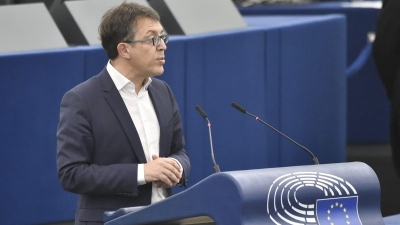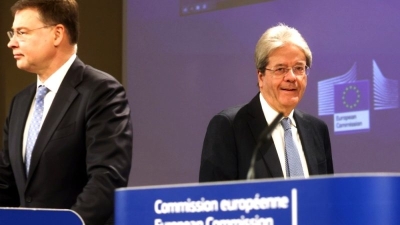What to expect from the EU’s power market revamp

Welcome to EURACTIV’s Green Brief, our weekly selection of energy and environment news from across Europe. To subscribe, follow this link. You can also subscribe to our daily newsletter here and to our comprehensive weekly update here.
In politics, sometimes there are telltale signs of where things are headed. Such is now the case for the EU’s upcoming electricity market reform.
Over the past weeks, noises coming both from Brussels and EU capitals all point in the same direction: the reform of the EU’s electricity market will focus on long-term contracts for clean power generation – whether renewable or nuclear.
“It has become clear that we need to complement short-term markets with a more important role for long-term instruments to shelter consumers from price volatility and give credible price signals to renewable investors,” said Kadri Simson, the EU’s energy commissioner.
“How will we do that? We will allow industry to take advantage of power purchase agreements (PPAs) that allow them to buy electricity at predictable prices,” she said after a ministerial meeting last week.
“And where state aid is necessary, we will also promote contracts for difference (CfDs),” she added referring to instances where governments intervene in the short-term market to cover the potential gap between a pre-agreed contractual price for electricity delivery and the actual market price.
Simson was speaking on 27 February after an informal meeting of EU energy ministers, which discussed the upcoming reform of the bloc’s electricity market, due to be presented by the European Commission on 16 March.
The focus on long-term contracts is confirmed by a leaked draft of the EU’s electricity market reform, seen by EURACTIV, which proposed “to incentivise the use of long-term contracts such as power purchase agreements and two-way contracts for differences” as a way to lower the cost of renewable power.
“They provide long-term price stability for the consumer and the necessary certainty for the producer to take the investment decision,” says the draft.
While PPAs are concluded between two private operators – typically a renewable power producer and an industrial consumer of electricity – a contract for difference (CfD) is guaranteed by the state, which offers a pre-agreed price to energy generators investing in new production capacity.
As such, they are usually tied to a final investment decision to build new power plants, EU officials explain.
PPAs are particularly popular in Nordic countries, which already have a high share of renewables in their electricity mix. In those countries, more than 80% of renewable electricity generation is already covered by long-term contracts, EU officials say.
CfDs, on the other hand, are not frequently used for power generation. But the ones that do exist are typically concluded for renewable energy support schemes, with a price often guaranteed for a duration of twenty years, officials say.
CfDs are particularly appealing to France, which is looking for ways to remunerate both its existing fleet of nuclear power plants and its upcoming new reactors.
According to Paris, the aim of the EU’s electricity market reform should be to “finance the entire energy transition in Europe” and give price signals to “secure long-term investments in any low-carbon installation that contributes to the transition”.
“We think the possibility of putting existing installations under contracts for difference is a possibility that should be open to the member states,” said a source at the cabinet of Agnès Pannier-Runacher, the French energy transition minister.
“We had a lot of discussions with our European partners and with the Commission on this subject,” the source added, saying that “legitimate questions” were being raised about how to implement CfDs for “legacy” investments – i.e. existing nuclear plants.
“We’re looking into it, we believe there are constructive responses to show how they can be included in the market without discouraging investments in the transition,” the French source said.
Because they involve government subsidies, CfDs need to be cleared by the European Commission, which enforces state aid rules within the 27-country bloc.
And remarkably, Brussels has shown openness to this.
“Contracts for difference will cover low-carbon or renewable installations and allow them also to promote future investments in these production units,” Simson said last week when asked about options to finance future investments in atomic energy.
Simson’s reference to “low-carbon” installations is a nod to nuclear power, which is not a renewable source of energy but has a carbon footprint which is comparable to wind power and lower than solar.
Long-term contracts are not only supported by France and the Nordic countries, which already rely on them. They are also backed by Germany, which is in the midst of a vigorous push to accelerate the deployment of renewables to replace Russian gas.
“Offshore wind, in particular, will provide large amounts of energy that can then benefit the companies through so-called direct Power Purchase Agreements,” said Robert Habeck, the country’s economy and climate minister.
Like France, Germany is also looking at state aid to guarantee stable electricity prices for its industry. After a two-day government retreat over the weekend, Berlin said it was working on the introduction of a special electricity tariff for industry, ranging between €0.05 to €0.09 per kilowatt-hour.
Habeck did not specifically refer to CfDs but the gist of the German plan chimes with the French. With the European Commission also on board, it’s easy to join the dots to see where the reform is headed – it’s all about the long-term.

LEAK: Brussels targets 40% of clean tech manufacturing in Europe by 2030
The European Commission is drafting a new target to have at least 40% of clean technologies manufactured in the EU by 2030 as part of a drive to meet climate goals and strengthen energy independence. Eligible technologies include renewables, nuclear power and carbon capture and storage, among others.

Plans to ban fossil fuel heaters spark outrage in Germany
A draft law to ban the installation of new oil and gas heaters from next year has sparked outrage in Germany, adding fuel to continued government infighting in Berlin between the Greens and the Liberals.

EU hails ‘historic moment’ as UN seals treaty to protect high seas
The European Commission on Sunday (5 March) hailed a first international treaty to protect the high seas agreed by UN member states as a “historic moment”.
WARSAW. Poland’s Orlen to sue Russia for halting oil supplies. State-owned energy giant Orlen will take legal steps against Russia over its recent suspension of oil supplies via the Druzhba pipeline, the company’s CEO, Daniel Obajtek, announced. Read more.
BERLIN. Scholz backs transport minister in attempt to save combustion engine. German Chancellor Olaf Scholz has voiced his support for liberal Transport Minister Volker Wissing’s threat to block the final vote on the EU’s de facto ban on new petrol or diesel cars as of 2035. Read more.
PARIS. French MPs pave way to dropping legal limit on nuclear in energy mix. Lawmakers voted in favour of doing away with the 50% legal limit on nuclear in the country’s total energy mix on Thursday as part of France’s larger efforts to build newer, more modern nuclear plants. Read more.
BRATISLAVA. Slovakia moving forward with biggest investment in green electricity. Slovakia has approximately €122 million earmarked for developing renewable electricity production in the National Recovery plan. Read more.
ROME. Italy rejects ‘ideological’ EU ban on combustion engines. Italy says no to the EU regulation banning internal combustion vehicles by 2035 unless the EU Commission revises its position and proposes environmentally and economically sustainable alternatives. Read more.
‘Ray of hope’: 5,700 solar panels donated to Ukraine. The European Commission on Friday (3 March) welcomed a commitment by Italian power utility Enel to donate 5,700 solar photovoltaic (PV) panels to Ukraine as part of the ‘Ray of hope project’.
“Following my announcements in Kyiv one month ago, today we can announce that a first batch of solar panels will be delivered to Ukraine soon. I want to thank Enel which is donating 5,700 solar panels to Ukraine,” said Ursula von der Leyen, the President of the European Commission.
The solar panels, of 350 Watt each, amount to a total capacity of around 2 MW, with delivery set to take place by summer 2023. This is part of a wider initiative announced by President von der Leyen on donations of solar panels to Ukraine during her visit to Kyiv on 2 February 2023.
The donated solar PV panels will cover up to 11,400 square metres of roofs split among different public buildings in Ukraine. They will be allocated to key public buildings in Ukraine providing essential public services, such as education and health, according to the priority list established by the Ukrainian government.
“I am convinced that other European companies as well as Member States will be inspired by this first step, so that Ukraine can rely on clean electricity, produced at home,” von der Leyen added. More information here. (Valentina Romano | EURACTIV.com)
////
Italy sides with France on EU power market reform. Italy’s entreprise minister Adolfo Urso and French economy and finance minister Bruno Le Maire adopted on Friday (3 March) a joint declaration titled: ‘A Shared Vision of the New EU Industrial Policy towards the Green and Digital Transition’.
Among a wide range of other topics, the joint declaration supports a “swift and ambitious” reform of the EU’s electricity market, which the European Commission is due to present on 16 March.
“The current market design fails to (i) ensure that consumers are fairly exposed to the full long-term costs of the low-carbon generation facilities that supply them and (ii) provide long-term incentives to invest in production capacities needed to ensure our security of supply,” the declaration reads.
According to Rome and Paris, the EU’s new market design should complement in a structural way short term markets with long-term instruments such as Power Purchase Agreements (PPAs), Contracts for Difference (CfDs), as well as Capacity Markets for storage and thermal capacity.
The declaration also mentions the EU sovereignty fund, joint work on critical raw materials and cooperation on hydrogen. The joint statement is available here. (Valentina Romano | EURACTIV.com).
- Why European mayors support ambitious building retrofitting goals – Júlia López Ventura
- How to design Europe’s net-zero industry plan – Jakob Hafele and Jonathan Barth
- Why the EU needs bold and broad strategies for critical minerals – Fatih Birol and Pascal Canfin
- Critical raw materials, or cotton candy and rainbows? – Leon de Graaf
- Protecting electricity consumers from (more) price shocks – Lion Hirth
MARCH
- 9 MARCH. Trilogue negotiations: Revision of the Energy Efficiency Directive (EED).
- 14 MARCH. Net Zero industry act – European critical raw materials act.
- 16 MARCH. Revision of EU’s internal electricity market design.
- 16 MARCH. Environment Council.
- 22 MARCH. Consumers package:
- Substantiating environmental claims
- Sustainable consumption of goods – promoting repair and reuse (the right to repair)
- 22-24 MARCH. UN Water Conference, New York.
- 23-24 MARCH. European Council.
- 28 MARCH. Energy Council.
APRIL
- 18-19 APRIL. Informal meeting of environment ministers.
MAY
- 17 MAY. Proposal for EU hydrogen bank.
- 17 MAY. Measures to reduce the release of microplastics in the environment.
JUNE
- JUNE. European Parliament Plenary vote on the EU Nature Restoration Law.
- 6-7 JUNE. EU Green Week.
- 19 JUNE. Energy Council.
- 20 JUNE. Environment Council.
- 21 JUNE. Greening transport package.
- 29-30 JUNE. European Council.
- 30 JUNE. Deadline for European Member States to update their revised National Energy and Climate Plans (NECPs).
SECOND HALF OF 2023
- Q4. Revision of REACH regulation.
- 26-27 OCTOBER. European Council.
- 30 NOVEMBER-12 DECEMBER. UN Climate Change Conference (COP 28), Dubai.
- 14-15 DECEMBER. European Council.



